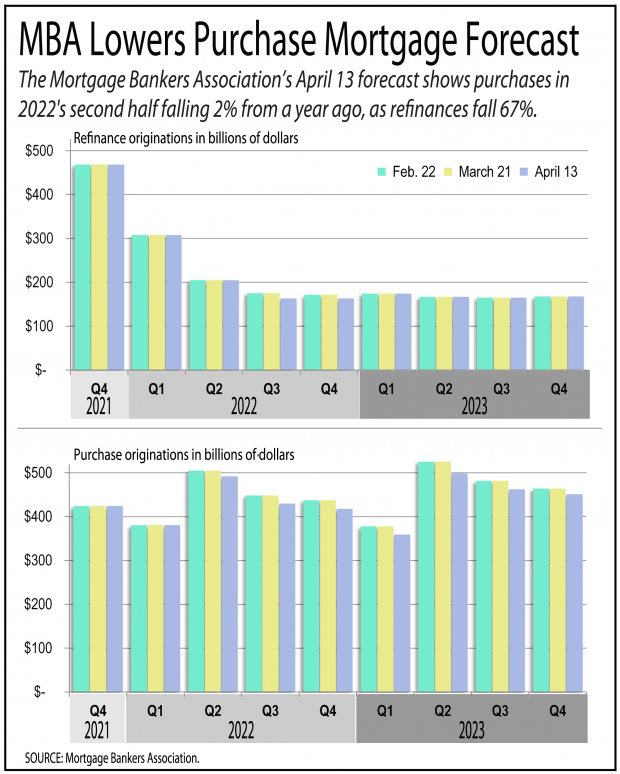MBA Lowers Mortgage Outlook Through 2023 - The 30-year fixed-rate exceed the 5% mark at 5.13% — the highest since November 2018.
The Mortgage Bankers Association on Wednesday lowered its forecast for both refinance and purchase originations this year and next as interest rates rise faster than it anticipated and expectations rise for more aggressive actions by the Fed to curb inflation.
MBA Chief Economist Mike Fratantoni said mortgage rates have risen by more than 1.5 percentage points since Jan. 1.
“This rapid increase in rates, caused by a much more rapid pace of rate hikes and balance sheet reduction from the Federal Reserve, is in response to the booming job market and inflation being at a 40-year high,” Fratantoni said. “The jump in mortgage rates will slow the housing market and further reduce refinance demand the rest of this year.”
Also on Wednesday, the MBA reported the fifth consecutive drop in its Weekly Mortgage Applications Survey. The number of applications in the week ending April 8 was 1.3% lower than the previous week after seasonal adjustments.
Joel Kan, the MBA’s assistant vice president of economic and industry forecasting, said mortgage rates across all loan types continued to move higher, with the 30-year fixed-rate exceeding the 5% mark at 5.13% — the highest since November 2018.
“Refinance activity as a result declined to the slowest weekly pace since 2019,” Kan said. “Higher rates are increasing borrower interest in ARMs. Their share of applications last week was at 7.4%, which was the highest share since June 2019.”
The MBA’s April 13 forecast showed higher expectations for interest rates than its March 21 forecast, and lower expectations for economic growth, housing starts and home sales through the end of 2023.

As a result, MBA economists lowered their forecasts for purchase originations from this month through December 2023 by 3% to 5% per quarter. Its 6% downward revision for refinance mortgages was confined to the second half of this year.
The collapse of the refi boom is the biggest factor in this year’s expected 36% drop in total originations to $2.56 trillion. Refinances are expected to fall 64% to $841 billion this year, followed by another 20% drop in 2023 before rising 10% in 2024.
The MBA now forecasts purchase originations to rise 4.6% to $1.72 trillion this year, followed by gains of 3% in 2023 and 4% in 2024. Fratantoni said the 2022 purchase volume will still be a record.
Existing home sales are now expected to fall 0.4% this year, reversing the 2.6% increase from the MBA’s March 21 forecast. Despite a healthy job market and a large cohort of young, would-be first-time home buyers, sales are being limited by low inventory and high prices.
“Even though existing sales volume will be slightly lower than last year, the continued growth in new home sales and the swift rise in home prices should deliver a smaller, but solid, 4% annual growth in purchase origination volume,” Fratantoni said.
Jim DuPlessis

Comments
Post a Comment
Please no profanity or political comments.